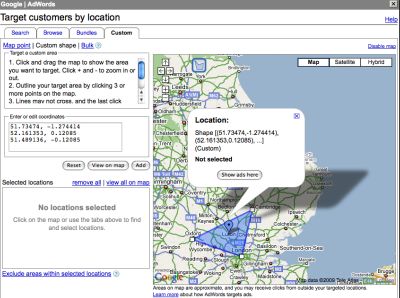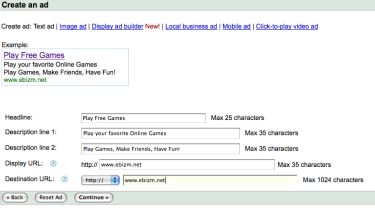Pay Per Click (Page 2. Contd)
Is AdWords/PPC the right choice?
Before you proceed, you need to re-think about joining AdWords. Nothing beats a good position on the natural search result page when it comes to higher click through rate (CTR). If you showing up in top -10 (or even top 20) results then you don't need to put your money in AdWords, instead invest more in your SEO efforts.
The first step is to figure out how much you are willing to spend for every sale. There is no general rule for determining your maximum cost-per-sale, it's a business decision you got to make. Then you need to look at the conversion rate - the percentage of people who click your ad (or visit your website) and then actually buy or contact you. Conversion rate vary from website to website but the industry average is less than 2%.
So how should you pay for a single click? You can calculate this multiplying your max cost-per-sale by the conversion rate. Let's assume that the most you can afford to pay for a single sale is $20 and your conversion rate is 2%. Then the amount you can afford to pay for a click is ($20* 2% = $0.40) $ 0.40.
If you estimate a one-percent click -through rate, one percent conversion rate, and 35c per keyword, you'll probably get a ballpark guess of what AdWords might cost-and earn- you. AdWords could be expensive as with most open bidding system. But it could be the most effective as well. If you have money and want an campaign out soon, then it's your best option.
Let's Click!
You can either create a Keyword Targeted campaign or Placement Targeted campaign. Keyword targeted campaign - you pay per click. While in Placement Targeted you pay per click or per impression (your ads would only be shown on Google's partner's sites. We'll have a look at Keyword targetetd campaign.
1) Enter your Campaign & Adgroup name e.g. Ebizm1 and Online Games.
2) Choose Language and Location.
Figure what out langue your target audience speaks or uses which Google Interface. You need to select the language/s in which you want your ads to be in. You can select one of over 40 languages. When determining where to show your ads, the AdWords system looks at a user's Google interface language ( google.fr, google.de) setting to see if it matches one of the languages that your campaign targets. For example, only users whose Google interface language is French will see ads in a campaign targeted in French.
[NOTE - Google does not translate for you - so you would need to write the add in your chosen language.]
Select the location's where you want your ads could be shown. Be as local as possible as possible, analyze where your mostly likely customer come from. You can select from Countries & Territories, Regions & Cities or Customize your target location be entering address, latitude and longitude or Custom shape (on the map).

[NOTE - Location targeting at Campaign level only]
3) Then you create your ad. You can either create
- Text Ad Ads that you see along side regular search listing on Google and its Search Network
- Image Ads Appear only on Google's Content Network.
- Display Ad Builder Google allows you to create your own display ad (appears only on Content Network)
- Local Business Ads Appear with an enhanced map component when shown on Google Maps, Google Earth, and third-party sites that use Google Maps technology. They appear in standard text ad format on Google and its Search & Content Partners.
(Before you create a local business ad, you must create a business listing in the Local Business Centre.)
Your ad's information window in Google Maps will features interactive links like Get Directions, Street View (where available), Save to My Maps and Send (users can send your business info to their Email, Phone, Car (only BMW and Mercedez Benz) and GPS).
- Mobile Ads Text ads only for mobile devices. Pricing model for mobile ads is either Pay-per-Click or Pay-per-Call.
- Click to play Video Ad Video ads that would appear only on Google's content network. The ad will appear as a static image until a user clicks on it and your video is played.
4) Creating Your Ad.
Your ad should be precise, informative and relevant to the product or service you are advertising for. Make sure you follow Google's Editorial Guideline. There are four key aspects of your ad.

Headline The first thing audience sees is your ad's headline, so make it stand out with a phrase that's enticing and novel, yet explanatory (within 25 characters).
Description Similarly Google gives you only 2 lines of 35 characters apiece for your description, so every letter counts. Focus on products or services you offer rather than distinguish yourself from competitors.
Display URL Usually the address of your website. All display URLs within an ad group must have the same top-level domain.
Destination URL This is the page people actually go to when they click your ad. The viewers cannot see this link. You can directly bring visitors to the advertised product or service page. If you want even create a page just for that particular campaign. On the top left side of your page, you can see how your ad will look like.
5) Choose your Keywords - Keyword Research
Almost all-online marketing has foundation in Keywords. You need to know your market inside out, know your competitors, and look at their PPC campaigns and how their ads are showing up in search results. Try searching for your product/service on Google and other search engines and look at both the natural search listings and sponsored links. Pay attention to what types of strategies, ad text, and promotions other similar businesses may be using in their ads; get yourself updated with the market trends.Depending on your budget, you would need to look for distinctive or alternative words/phrases, mix and match your keywords and phrases. The most popular keywords are expensive e.g. Online games, free games. Plan your ad that will help you to distinguish your ads from the rest.
You need to spend quality time in order to get the right keywords/ phrases that suit your budget. There are Keywords Research tool - websites, some charge you for their services, while others are free (some big marketing and consulting firms have their own Keyword research tool systems). Such sites would give you a fair indication of how the world has been searching - what keywords /phrases have been used.
Google Adwords' Keyword Estimator Tool
* Google Search-based Keyword Tool
Google Trends Keyword Demand Prediction Tool
Microsoft AdCenter Keyword Forecasting Tool
Wordtracker's Free Basic Keyword Demand Tool
KeywordDiscovery Free Basic Keyword Demand Tool* New tool from Google, looks at the content of your website and matches it against Google search queries, providing a list of relevant, actively searched keywords.
Based on your Research and Analysis select your Keywords. You can always add/edit/remove keywords, so consider starting with just a few to test the waters.
You also need to tell Google how you want your keywords to be dealt with - you have 4 options. For the explanation purpose I assume that you have select shirt as a keyword
1) Broad Matches - No Punctuation e.g. shirt Google will display your ad when not only when someone searches for shirt but also when they look for synonyms, plurals and related phrases (e.g. cotton shirts for charity, blood stained shirt). While it seems like a good way you need to avoid if you want relevant people to look at your ads.
2) Phrase Match - put your phrase in quotes e.g. "cotton shirt" Your ads will be displayed only when people search for that phrase, e.g. "cheap cotton shirt", "cotton shirt London"
3) Exact Match - put your phrase in brackets e.g. [Cotton Shirt] An exact match is a variation of the phrase match; except Google doesn't show your ad if somebody searches includes anything other than exact phrase like "cheap London hat" search will not display your ad.
4) Negative Keyword - Put a minus sign before the word or phrase you want to ignore e.g. -ugly
